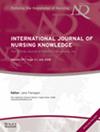Social jetlag and body mass index among shift-working nurses in Korea: A cross-sectional study
Abstract
Purpose
Shift-working nurses must function against their natural circadian system and are, thus, bound to be detrimentally affected by social jetlag. Circadian rhythms play a crucial role in regulating homeostasis, and social jetlag may increase one's risk for obesity. Therefore, this study aimed to identify associations between social jetlag and obesity among shift-working nurses.
Methods
This cross-sectional study included 183 nurses working rotating shifts in South Korea. Chronotype and social jetlag were measured using the Morningness-Eveningness Questionnaire and the Munich Chronotype Questionnaire for Shift-Workers, respectively. Obesity was defined as a body mass index of 25.0 or higher, which was calculated using self-reported height and weight data. The associations between chronotype, social jetlag, and obesity were investigated using multiple logistic regression analysis.
Findings
A total of 183 nurses were included in the analysis (81.4% women and 80.3% single, median age = 27.00 years). Majority of the participants’ (95.1%) chronotypes were moderate evening or intermediate type. The mean overall social jetlag was 3 h and 31 min. The odds for obesity were 8.44 times higher among shift-working nurses whose social jetlag was over 3 h and 31 min (95% confidence interval: 1.66–42.99) while controlling for chronotype, exercise time, and eating habits.
Conclusions
Social jetlag may increase the likelihood of obesity among rotating shift-working nurses.
Implications for Nursing Practice
To achieve positive outcomes for promoting nurses’ health, upper nursing management should consider individual nurses’ social jetlag when scheduling shifts. In addition, nursing managers should have the responsibility to educate nurses involved in shift work about the adverse effects of social jetlag.

 求助内容:
求助内容: 应助结果提醒方式:
应助结果提醒方式:


